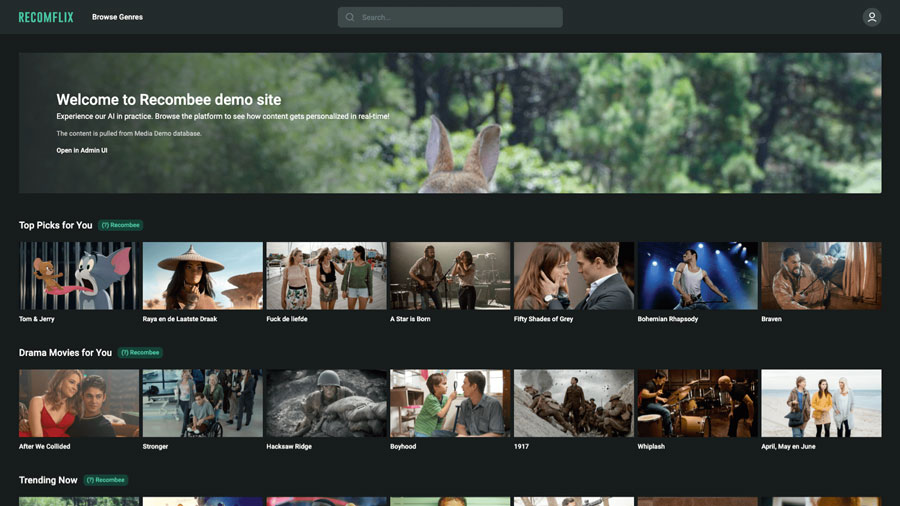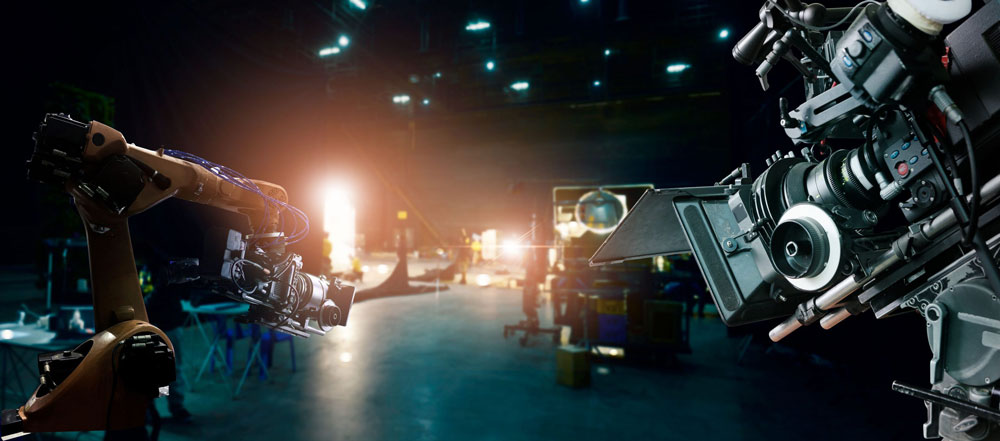Without a doubt, there has been a rapid transformation in technology, especially in the entertainment industry. Whether it’s enhancing quality in movies and television or finding new and inventive ways to produce content, the sole purpose is to increase engagement with the consumer.
If you want to learn more about how AI supports entertainment and media companies, here we will go over how it’s used, the types of AI applications, and more.
AI in Entertainment Industry Overview at a Glance
Below is an overview of what will be covered in this article. We will give you a general idea of the primary topic, what types of media AI technology is best for, the target demographic, and what media and entertainment companies use for AI applications.

Primary Topic: AI Impacting the Entertainment Industry
Best for:
- Movies & TV
- Sports & Gambling
- Theater, Music, and Performing Arts
- Social Media
Target Audience: Media Consumers
Types of AI Applications Used:
- Meta Tagging
- Conversational AI
- Automation Report
- Subtitles
AI in Entertainment Industry: Different Types
Believe it or not, AI has been a staple in enhancing media and entertainment content for a while, even before the pandemic. AI can produce media and entice consumers based on their engagement. They use the user’s data analytics to generate media they would be interested in.
What is Machine Learning?
One of the ways that media benefits from using AI in the entertainment industry is by implementing machine learning when producing and managing content for consumers. Machine learning is a type of artificial intelligence that can predict accurate outcomes by aggregating data using software applications.
Based on predictive analytics, machine learning helps the consumer in what they want to view or are interested in. For instance, if the user frequently engages with action movies and action-related content, the applications will record that data so that next time, it will predict that genre based on the machine learning algorithms.
In terms of video streaming, another example would be that, based on data science, it will recommend similar videos based on what the user watches. The primary reason this artificial intelligence is so important, especially in the entertainment industry, is that generating predicted results can lead consumers to media and entertainment companies’ content.
Digging Deeper with Deep Learning
If machine learning improves streaming quality through content personalization, deep learning is next-level technology that’s a game changer. Deep learning is a subtype of machine learning that attempts to replicate how a human learns. In doing so, AI algorithms can make predictions about human behaviors to influence decision-making.
Consider deep learning as the higher-value option that helps teams tap into current trends and preferences. These capabilities make it possible to achieve a broad range of goals faster than ever before, all while improving the end-user experience.
What are Augmented Reality (AR) and Virtual Reality (VR)?
Other types of artificial intelligence that most media and enterprise companies use would be Augmented Reality (AR) and Virtual Reality (VR). AR refers to technology that enhances natural world environments with generated elements like images and sounds. For example, the game development world uses AR for popular mobile games, like Harry Potter: Wizards Unite and PokemonGo.

VR has the same properties and uses, and the only difference is that instead of enhancing natural world environments, it generates simulated experiences. One of the primary examples of this type of AI is VR gaming, which consists of a headset and two singular game controllers.
It may not seem like it, but AR and VR play a pivotal role in the media and entertainment industry. For instance, entertainment companies also utilize this type of AI for reality shows and live events. Media companies can also format TV shows and movies for VR to create a fully immersive experience.
Meta Tagging
Another form of AI that is primary use in the media and entertainment space is metadata tagging. This AI helps media creators organize their videos, images, and other content by topic, so it’s easier to identify in the future.
In the entertainment sector, for instance, CBS Interactive uses AI to tag its content correctly, benefiting its overall customer experience. Its primary goal is to structure media and entertainment by adding specific tags such as objects, locations, scenes, etc. These AI tools eliminate the hassle of manually tagging by generating automated meta tags. Utilizing metadata tagging can increase the content’s quality and customer engagement activity.
Conversational AI in Entertainment
Conversational AI is another type of AI staple in the entertainment and media industry. One of the more popular ways this AI technique is used is for e-commerce, travel, and business, primarily for customer service.
Many event venues, theaters, and performing arts centers can benefit from using AI chat solutions over outdated, less personal chatbots. Unlike chatbots, which are only capable of limited pre-programmed responses, conversational ai possesses a contextual understanding and shared intelligence that makes them a reliable customer service tool.
Enhance Content
One of the ways that conversational AI can help enhance visual content, especially for media and entertainment purposes, is with user personalization. The customer is a top priority, so companies produce branded content to approach potential or current users in a more natural way.

Provide Relevant Information
Conversational AI in entertainment is more efficient and reliable than traditional alternatives because it can provide relevant information to answer online questions and guide users based on their interests. It’s possible to drive the decision-making process and increase sales.
Collect Data Organically
Conversational AI is capable of natural language processing and collecting new information. These features keep the entertainment business updated on individual preferences and trends while engaging users on a deeper level. The entertainment sector can then use that information to refine marketing and sales strategies for individual users seamlessly.
Automated Report
Automated Report allows companies to keep track of channel performance reports for user engagement. Here, they usually would use technologies such as Natural Language Processing (NLP) and Machine Learning (ML) to generate these reports to share by the Broadcast Audience Research Council of India (BARC). The BARC is usually what records weekly data from channel performance.
Subtitles
This feature produces functional, easy-to-understand content for current or potential consumers. Many companies use this AI tool to translate content automatically, eliminating the hassle of manually completing it.
The Benefits of Utilizing AI-Based Technologies
So, now that you have an idea of what types of AI can benefit the media and entertainment industry, it’s essential to note how these companies can take advantage of this to strengthen their business.
Enhanced Marketing Strategies
One of the vital uses of AI is to increase consumer engagement and to expand their marketing strategies for advertisement. As previously mentioned, social media and movie streaming services can utilize user data to see what they are engaging in and recommend similar content to them to increase their click-through rate and engagement activity. Most of their algorithms are powered by AI, which helps generate automated recommendations.
Efficient Film Production
Usually, when film creators have to edit their movies, it takes a significant amount of time. However, with the help of utilizing AI helps in checking and maintaining their film by automatically checking for errors, syncing the videos, etc. This way, filmmakers don’t have to edit and synchronize manually.

Personalized Content and User Experience
As previously mentioned, one of the ways media and entertainment companies use AI to their advantage is by generating personalized content to increase user experience. Their marketing strategy is to cater to those users and develop automated, personal recommendations based on what they engage in the most.
Efficient Use of AR and VR Technologies
AR and VR technologies are one of the many types of AI used in media and entertainment spaces for advertising or entertainment purposes. For example, there are VR/AR-powered video games for those to play with the VR headset and game controllers.
Search Optimization
Search optimization, powered by AI, allows the user not only to find what they are looking for but for similar results to that topic to come up as well. This is a primary benefit of utilizing AI, and several examples of this would be Google, Bing, and other search engine platforms.
Top 4 Areas of Media Affected by AI in the Entertainment Industry
The media industry loves to use AI primarily because it cuts down the tedious process of producing and keeping track of content and user data. Here are our top four areas of media affected by AI.
Movies & TV
This type of media is greatly affected by AI in the entertainment industry. Artificial intelligence helps production teams reduce the time needed to edit, synchronize and format material before getting the videos uploaded.
One of the more popular tools for utilizing AI for movies and tv is deepfake, primarily for advertising, parody skits, and memes. Deep fake refers to an ai technique that synthesizes media. Unfortunately, it can superimpose human features onto another person, which can be problematic and unethical.
Sports
AI has been a popular form of tool for professional and college sports, and it’s not just beneficial for sports broadcasting platforms, either.
- Organizations can use AI in event venues to support ticket and merchandise sales.
- Sports analytic companies can track and manage sports team data and compare it to others, making it easier to refine game strategies.
- Computer vision, which is AI analysis of images or videos, can be used in tandem with data science to better understand and improve an individual athlete’s performance.
Sports is a massive business that requires big data to function at the highest level and employing AI techniques has had a notable impact across the industry.
Theater, Music, and Performing Arts
Utilizing AI is already popular in the music industry. It can track user data based on what genre of music they enjoy listening to, formulate playlists and recommend new artists to improve the customer experience.
Another way is for AI-enabled crowd monitoring for a live event. Teams can use AI in performing arts and concert halls to fully monitor live shows to ensure no potential risk of emergencies.
AI can also support the entertainment field by enhancing the customer experience without increasing staffing.
- Embracing AI to provide information about the venue and artists to answer questions creates an interactive experience for visitors.
- It can guide people through the event, so they reach seats faster, locate facilities, and more.
- Event teams can utilize AI technology to monitor crowds and security to create a safer experience for everyone involved.
- Using AI in theaters and other venues can serve as support staff for ticket sales while encouraging them to purchase for future events based on their preferences.
It’s possible to stay ahead of the game and support the rapid growth in live performances since the COVID-19 pandemic shut everything down. AI-based platforms can help people learn to navigate venues again and draw them back for more events.

Social Media
Social media is synonymous with using AI, including video streaming with platforms like TikTok and Snapchat. They not only utilize machine learning to predict similar content based on user data but also use analytics to pander to their users by advertising shows, products, and other forms of content. In fact, AI may soon be able to use social media to determine the severity of natural disasters.
AI does more than monitor a person’s likes or interests for targeted ad delivery. It can also create social media posts itself. Automated reporting can give you great insights into what content you produce is engaging customers the most. Data science can provide data-driven decision-making with your social media accounts.
Content Creation Using AI
Although it can be used for maintaining and keeping track of content, it can also be helpful for content creation. The media and entertainment industry relies on content for marketing and information purposes. Still, it’s a time-consuming, data-intensive task. You have to monitor web analytics to look for keywords and structure content for SEO purposes.
Marketing and sales teams can reduce the strain by employing AI-based content creation systems. AI technology can generate content based on key elements, like topic and tone. As previously mentioned, advanced AI technologies can replicate the human experience and use natural language processes to deliver reliable content that strikes all the chords. It’s possible to employ AI content creation for everything from blogging to social media.
Takeaway
There are numerous ways that AI is beneficial for the media and entertainment industry. As many consumers take to mobile devices, this technology will be the best option for delivering high-quality content across social media, movies, sports, gambling, or music.
The primary focus for anyone in the media and entertainment industry is increasing engagement with their content and promoting sufficient user experience. Advanced technologies like AI can help media companies attain those goals. We hope you enjoyed reading this article!




